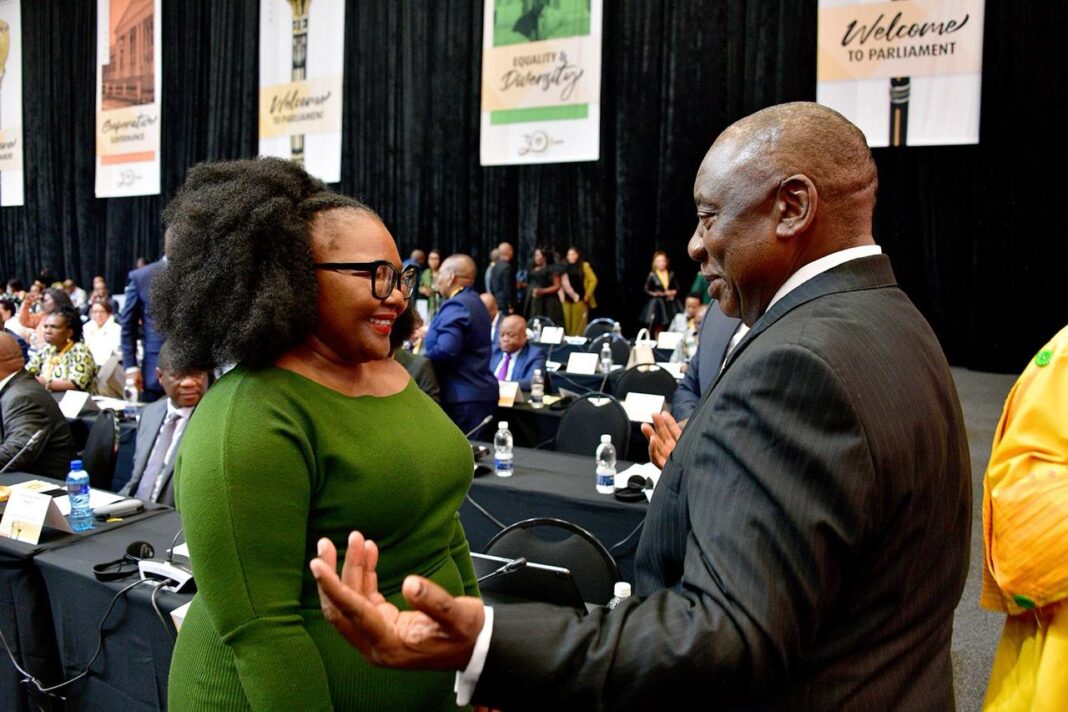Johnathan Paoli
THE African National Congress (ANC) has formally welcomed five parties who have so far joined what the party has referred to as a “government of national unity” (GNU).
In a statement released on Monday, national spokesperson, Mahlengi Bhengu-Motsiri said this coming together of parties was a collaborative effort in a shared commitment to uphold the constitution, promote non-racialism, and ensure social justice and equity for all South Africans.
Bhengu-Motsiri confirmed that five parties have officially signed the Statement of Intent to participate in the GNU including: the ANC, Democratic Alliance (DA), Inkatha Freedom Party (IFP), GOOD and the Patriotic Alliance (PA), with discussions with other parties still ongoing.
Collectively, this grouping represents 273 seats or 68% of the National Assembly (NA).
Bhengu-Motsisi said the results of the national and provincial elections, in which the ruling party secured 40% of the national vote and faced challenges in Gauteng and KwaZulu-Natal, necessitated cooperation with other parties to advance the transformative agenda.
“The GNU emerged as the optimal approach to defend and advance our vision of a united, democratic, non-racial, non-sexist and prosperous South Africa,” she said.
The spokesperson said the collaborative initiative was founded on core principles which included: upholding the constitution and rule of law, promoting non-racialism and non-sexism, and ensuring social justice, redress, equity and poverty alleviation.
“Our aim is to foster nation-building, social cohesion, and unity in diversity while maintaining peace, stability, and safe communities,” Bhengu-Motsiri said.
She said, despite rumours, the GNU’s priorities and minimum programme are fully aligned with the party’s long standing commitments and policies of creating a just society which addresses poverty, spatial inequalities, food security, and the high cost of living, while protecting workers’ rights and delivering quality basic services.
“We are dedicated to achieving rapid, inclusive, and sustainable economic growth, job creation, land reform, industrialisation and infrastructure development. The GNU will ensure representation in government and legislatures by all participating parties, making decisions by consensus, with mechanisms for conflict resolution where necessary,” she said.
The spokesperson highlighted the need to dispel any misconceptions regarding “the opposition’s ability to outmanoeuvre the vision of the party, considering its reasoning and leadership as demonstrated by the ANC’s continued presence in eight of the nine provinces.
“The GNU, an ANC-led initiative, ensures that no single party, whether it is the DA, IFP, or others, can hold our national agenda hostage,” she said.
She concluded by reaffirming the party’s commitment to inclusive governance and national dialogue, and invited all sectors of society to participate in forging a social compact aimed at tackling inequality, poverty, and unemployment.
This comes on the heels of former president Jacob Zuma’s Umkhonto weSizwe (MK) party declaring its allegiance to the group of opposition parties who have formed a Progressive Alliance.
The caucus is a group of parties that have indicated they will cooperate to take on the ANC-led GNU, which include the Economic Freedom Fighters (EFF), United Democratic Movement (UDM), Al Jama-Ah, African Transformation Movement, United Africans Transformation and the Pan-Africanist Congress of Azania.
MK party spokesperson Nhlamulo Ndhlela said that while the elections had seen “daylight robbery” of votes, parties forming the opposition alliance have achieved around 30% of seats in the NA.
Ndhlela denounced South Africa’s coalition government as a “white-led unholy alliance” and accused the ANC of going to “bed with racists”.
President-elect Cyril Ramaphosa is expected to announce the appointment of his cabinet, including the position of leader of government business and the vice-presidency.
While calls hounded the previous administration for a drastic cut in the number of cabinet positions, it is speculated that the number might increase in order to accommodate the leaders and demands of the other parties in its coalition government.
INSIDE POLITICS

